
We've interviewed 50+ top sales leaders to get their best sales advice, tips, and strategies that have transformed the way we sell today.
From accomplished entrepreneurs who've grown sales organizations that have generated billions of dollars throughout their careers, to executives that have built the sales engines powering companies like LinkedIn, Google, and Box, to the bestselling authors who've literally written the books on how we think about selling today—we're bringing the heat with sales advice from today’s top sales professionals.
Think of these people as your personal mentors—and they’re about to drop a lifetime of selling wisdom into your lap. Here are the best pieces of sales advice for salespeople in 2024:
1. View Failures as Learning Opportunities
— Jill Konrath, Bestselling Author, Speaker, Sales Consultant
 |
Konrath has built a long-lasting career for herself as a speaker, author, sales consultant and trainer with Fortune 500 brands. Her best piece of sales advice?
“My best investment in becoming a better salesperson wasn’t in a course or a book—the best investment I ever made was changing my mindset,” shares Konrath.
During her first year selling copiers at Xerox, Konrath had a life-changing moment. After booking a sales meeting with an executive assistant, and then trying to go around the assistant—directly to the CEO based on advice from a sales book she had read, Konrath experienced a very painful failure.
Once she arrived for her meeting, expecting to see the CEO, Konrath was greeted by the executive assistant, who felt disrespected by her attempt to sidestep the assistant’s authority. After being yelled at for a few minutes, Konrath fainted right there in the lobby of her prospect’s office.
It was time for some soul-searching once she recovered. “I made a decision at that point that I had not failed. I just had a valuable learning experience,” Konrath explains. “Over my career, I’ve had a lot of valuable learning experiences, and not one failure. I’m on a figuring-it-out journey, and that one choice has made all the difference in my career.”
2. Remember That Sales is Personal
— Jimmy Daly, CEO at Superpath
After running sales at a 50-person agency, and now handling all sales at Superpath, Jimmy offers us this evergreen advice for effective sales that’s especially important in this economic environment:
“Sales are personal. Get to know the people you are selling to. Where do they go on vacation? What are their hobbies? Take a genuine interest in them as people, not just prospects. This goes a long way toward creating a comfortable working environment.”
Be interested in the personal lives of your potential customers, and you’ll develop deeper relationships with them.
3. Hire a Sales Coach
— Trish Bertuzzi, Bestselling Author, Sales Consultant, and Speaker
 |
Bertuzzi has been in sales for nearly three decades, having helped more than 320 world-renowned brands build world-class inside sales teams through her consulting company, The Bridge Group. She’s also the author of the #1 Amazon bestseller, The Sales Development Playbook. Here’s her advice for a more fulfilling sales career:
“I am over the moon excited to be working with a sales coach. I’ve had one session so far, and holy crap. The reason I think coaching works so well for me is that I record all of my sales calls, and coaching helps me realize things I’ve never even thought about.”
Believe it or not, many of today’s sales experts see the value in having a coach or a mentor who can help bring a fresh perspective to their selling style.
Here’s an example that Bertuzzi elaborates on, “When I’m talking to someone, and they’re telling me what the current state is, I don’t compliment them enough on what they’re doing right—it’s a waste of an opportunity to share empathy and develop a relationship with them.”
Even those at the top of their game (who’ve literally written the books on selling) can still make improvements and become more effective through critical feedback and the sales advice of others who come with their own unique experiences.
4. Understand the Market Landscape
— Will Yang, Head of Growth & Customer Success at Instrumentl
 |
“My best piece of advice for sales professionals in 2024 is to understand the market landscape they are in,” says Will.
“It's important to understand which organizations you can help, what their needs and goals are, and how best to position your product or service and its value proposition.
“To understand the market landscape, salespeople should get to know their prospects and customers thoroughly. They should understand their challenges and goals and how they want to accomplish them. This will allow you to tailor your pitch accordingly in order to properly address the individual needs of each organization.
“For salespeople struggling today, I would recommend getting comfortable with the unknown. Sales are almost always an unpredictable process, and it can be difficult to remain positive when you don't know what's going to happen next. Instead, focus on understanding your market, and you can make more informed decisions.”
5. Invest in Your Own Education
— Grant Cardone, Bestselling Author, Speaker, and Sales Trainer
 |
When it comes to sharing his best sales advice, Cardone, the consultant and multi-bestselling author of books like The 10X Rule and Sell or Be Sold, is a major advocate of continuing education.
“The best investment I ever made was when I was twenty-five years old, and I hated sales. I borrowed $3,000 from my mother to buy a sales program—it was twelve cassette tapes, and it took ten days for it to arrive,” Cardone shares.
“I made so much money from those tapes. I went from making $30,000 to making $100,000 a year. Most importantly, not only did I make more money, but for the first time in my life, I could say I loved sales. For the first time, I knew what I was doing.
“Ever since then, I’ve spent hundreds of thousands of dollars investing in myself and my people, in hopes of making us all better, more motivated, more strategic. Some of the programs don’t work, but I keep investing, knowing that it’ll pay off in the long run.”
Remember, education can run the gamut between online courses, individual sales training, podcasts, books, and more. Invest in the education that works for you.
6. Ask the Right Questions, Then Shut Up
— Sarah, Business Development Representative at Termly.io
This sales strategy from someone in the trenches is about knowing when to be quiet.
“Buyers will tell you everything you need to know. Take the time to develop just a few (3-6) really strong discovery questions, use them appropriately, and shut the heck up! Everyone really only wants to talk about themselves—listen to your buyer.”
Active listening during qualification and discovery will help you truly understand what your prospects need, and will make it more natural for you to present a solution.
7. Have a Plan for Every Sales Call
— Neil Rackham, Bestselling Author, Sales Consultant
 |
Rackham, the bestselling author of the book SPIN Selling, which pioneered consultative selling as we know it today, says the best sales tip he could possibly share, is to be adequately prepared before every single sales call or meeting with a prospect.
“Before I go out on an important sales call, with all the tools that are available, I still just carry around a little notepad and pencil. I’ll write down 3 or 4 good questions I want to ask, make a little plan, and then tear it up so that I’m not pulling it out in front of my prospect,” he shares.
For Rackham, the act of physically writing down his questions and knowing the rough game plan for how he wants the meeting to go, commits it to memory, and he’ll come off as much more on top of his game.
8. Live by Sandler’s Triangle of Success
— Vito Vishnepolsky, Founder of Martal Group
 |
“My best advice for anyone struggling with sales in 2024 is to live by Sandler’s triangle of success. Behavior, attitude, and technique are the three core areas every sales professional needs to work on if they want to excel at their job.
“A strong behavioral plan that’s focused on goals you can control is crucial. The best salespeople are those who set tangible objectives that are under their control and break them down into micro-routines. For example: instead of aiming to close twenty deals a quarter, you might choose to reach out to 100 potential customers a month and follow up with them consistently.
“Next comes your attitude — which often seems trivial but can actually have a major effect on both your behaviors and actions. Positive thoughts will greatly enhance your performance and keep you on the right track to success. On the flip side, drowning in your own fears or underestimating your own skills is what often kills your motivation to close any deals.
“As for techniques, you should be constantly trying new strategies that are outside your comfort zone while doubling down on the ones that deliver you results. A solid feedback system is also necessary because it can help you distinguish good tactics from bad ones and enable you to keep improving.”
9. Check Your Ego at the Door And Learn
— Aaron Ross, Bestselling Author, Sales Consultant, Speaker
 |
When it comes to building, scaling, and training a sales team, Aaron Ross sits near the top of every list of authorities on the subject. He even wrote the book on it. Here’s what he has to share.
“Going from being CEO of an internet company to checking my ego at the door and saying that I just want to learn—I’m going to take a job at Salesforce, and the only one they had was answering the 1-800 line, paid shit money, very little equity,” Ross explains.
After shutting down and liquidating his own startup in the dot-com bust, instead of just looking for a job that’d pay him the most, Ross made a conscious decision to remain humble and take a gig where he could build the skills he wanted to perfect.
Ross continues, “I was focused on wanting to learn, and because of that, I treated the job as if I was getting paid to learn. It wasn’t about ego; sure I was frustrated at times, but taking a job purely for the learning experience was the best investment I ever made.”
10. Defuse Objections Before Prospects Bring Them Up
— Lisa Richards, CEO of Candida Diet
“Studies show that the likelihood of a conversion decreases in proportion to the number of objections that a prospect raises,” explains Lisa.
“Hence, it's critical that you pre-empt these protests and disarm them before the prospect voices them. Start by identifying the most common objections you've come across in your sales process and then figure out how to address them throughout your sales pitch and presentations. This way, you’ll be able to successfully eliminate friction for the prospect, increasing their chances of making the purchase.”
11. Put in the Extra Time to Be Well-Prepared for Every Sales Call
— Sujan Patel, Saas Founder, Growth Marketer
 |
As the owner of multiple marketing agencies, Sujan has years of experience prospecting and closing complicated, high-ticket deals.
"For a lot of salespeople, the longer they're in the game, the more comfortable they get talking with leads and feeling out calls or meetings as they go. This kind of experience is invaluable, of course, but it can sometimes lead to complacency and placing less importance on being over-prepared.
"Especially for complicated, long-term deals, knowing the person and company you're talking to inside and out not only lets you tailor your conversations to their needs and anticipate common sales objections, but it also shows your prospect that you really know what you're talking about.
"Going the extra mile in your early conversations shows that you'll put in the extra work when they're a client or a customer, and can be the difference between a no and a yes down the line."
12. Embrace the Challenges That Come Your Way
— Michele Romanow, Co-Founder At Clearbanc, Serial Entrepreneur and Investor on Dragon’s Den
 |
A serial entrepreneur with a relentless drive, Romanow had to learn how to sell at a young age when she launched her first business during college. Gaining traction and learning how to sell with the first side projects set Romanow down a path to eventually selling one of her startups to Groupon.
When asked to share her absolute best sales advice, Romanow says it was making the decision to work a tough sales job—because it taught her not to fear rejection.
“The best investment I’ve ever made in becoming a better salesperson was taking a part-time job selling water heaters door-to-door. There was nothing scarier than going door-to-door, convincing people I wasn’t crazy, and actually getting inside their house to complete the sale,” Romanow explains.
Instead of shying away from a job that was clearly proving to be difficult, Romanow took this experience and turned it into a challenge for herself—one that she knew would help to sharpen a skill set that’d be useful for the rest of her life.
“To this day, nothing has taught me more than that job. As an entrepreneur, you should never underestimate how much of your success is based on your ability to sell. You sell to get vendors, customers, employees, investors, and partnerships. I’d tell anyone that’s young to take a hard sales job because you’ll learn so much and become so unafraid.”
13. Focus on Being Consistent, Disciplined, and Ditch the “Hacks”
— Steli Efti, CEO at Close CRM, Author, and Speaker
 |
Throughout my career as an entrepreneur, I often found myself having to be my #1 salesperson, especially in the early days of getting a new business off the ground.
Through my own ups and downs, the best sales advice I have is to learn early on in your sales career that hacks and charisma won’t save you. If you want to be the best salesperson you know, it’s going to take consistency and discipline.
Be consistent in your follow-ups. Be disciplined when it comes to cold calls and the things that are tough for you. Learn how to perform every single day, forever, no matter how you feel. For me, relying on my charisma and not my character to sell brought me inconsistent moments of brilliance and moments of total disaster.
My biggest shift was realizing that consistency is king, and character is how you win the long game.
14. Don’t Sell What You Don’t Believe In
— Noah Kagan, Chief Sumo at Sumo.com, Entrepreneur, and Marketer
 |
It’s easy to find yourself caught in a job selling something you don’t personally care about (or believe in).
Kagan explains, “Go find a product that you just believe in. Go out and sell it—practice selling it even if that company doesn’t hire you—just sell it for them. Because if you’re trying to get a job and you came to us and said, hey, I’ve signed up four customers for you, I’m ready to take it full-time and now you can start paying me, I’m going to take your call.”
It’s obvious when you’re being sold a bill of goods that the salesperson isn’t personally invested in. Remember, if the genuine excitement isn’t there, you won’t make the sale.
15. Take a Step Back to Build Relationships
— Seth Kinney, Senior Vice President of Global Sales at Inside Sales Solutions
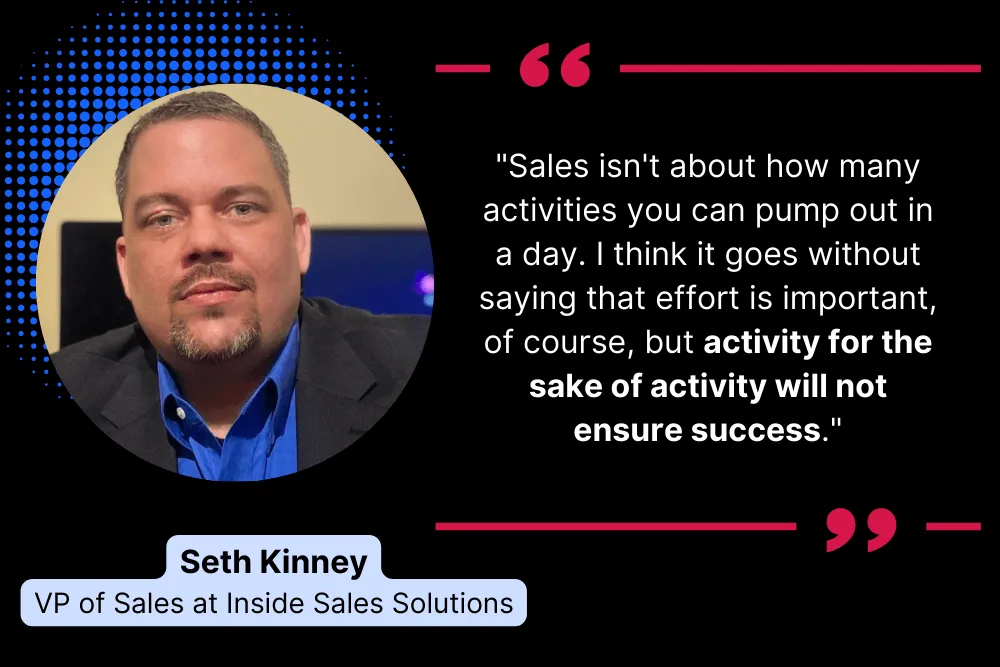 |
“The best advice I ever received was to focus on relationships first, and the rest will take care of itself,” explains Seth.
“People buy you before they buy anything else. Humans, in general, are typically going to buy with emotion, then justify with logic later. So it's important to be genuine. If you can master that, the rest will take care of itself.
“So, take a step back! Sales isn't about how many activities you can pump out in a day. I think it goes without saying that effort is important, of course, but activity for the sake of activity will not ensure success. It's much more important to focus on the intent behind the activity and build those solid relationships and rapport. Mindset really is everything, and not to be too cheesy, but whether you think you can or think you can't, you're right!”
16. Put in the Work and Get Your 10,000 Hours
— Juliana Crispo, CEO at Provide, Sales Educator
 |
When asked to share her best sales advice, Juliana Crispo shares something that on the surface may sound plain to see, yet is so often overlooked—the best sales training you can get is experience.
“The best investment I’ve ever made is in learning the hard part and taking the time to fail.”
Even the most experienced salespeople have failures. How you choose to deal with your setbacks will dictate whether or not you’ll stay in the game long enough to achieve mastery.
Crispo elaborates, “It takes 10,000 hours to become an expert at something—and those 10,000 hours of cold calling, prospecting, and rejection is brutal. But it’s that investment of time that’s necessary in order to truly understand sales. It’s the only way to become an expert at selling.”
17. Pay Attention to the Deeper Conversation
— Robert Hoffman, Sales Manager at CashbackHero
“When I first started in sales, I was so focused on getting a "yes" from customers that I forgot to pay attention to the deeper conversation that was going on,” says Robert.
“What really changed things for me was realizing that instead of trying to rush through a sale, it's more important to take time and build genuine relationships with customers. This includes being honest about what your product has to offer, listening intently and understanding their needs, and being patient with them. Doing this helps ensure you not only get a "yes," but also create long-term customers who will be more likely to come back again and again.”
Keep focused on what’s going on beneath the surface of your sales conversations, and you’ll build trust with your customers.
18. Experiment and Don’t Make The Same Mistake Twice
— Jamie Shanks, CEO at Sales for Life, Author, Speaker, Consultant
 |
Jamie Shanks, a seasoned veteran in the world of inside sales, has this to share when asked about his best sales advice. “The best investment I’ve ever made is in building my own confidence. What I’ve realized is that I’m willing to do things and learn, to get kicked in the teeth as long as I don’t make the same mistake twice.”
There’s no way around it in sales, you have to be willing to experience rejection. But it’s how you react to new information and the results of your experiments that will go on to define your future.
Shanks continues, “Experiment, try new things, but don’t do the same thing over and over again if it’s not working, expecting different results. Fail, pick yourself up, and become a little better. Invest in your own confidence and realize that you can do this.”
It all starts with having the confidence in giving yourself permission to experiment.
19. Keep Slow Deals Moving With Small Commitments
— Jimmy Daly, CEO at Superpath
 |
“Even for small deals, you can't always close on the first. If that's the case, ask for small commitments. For example, send a proposed timeline and ask for the prospect's feedback.”
Small commitments over time help you build trust with your potential clients and customers as you ease them closer to a deal won.
20. Surround Yourself With the Smartest People You Can
— Max Altschuler, Founder and GP at GTMfund, Author, Speaker
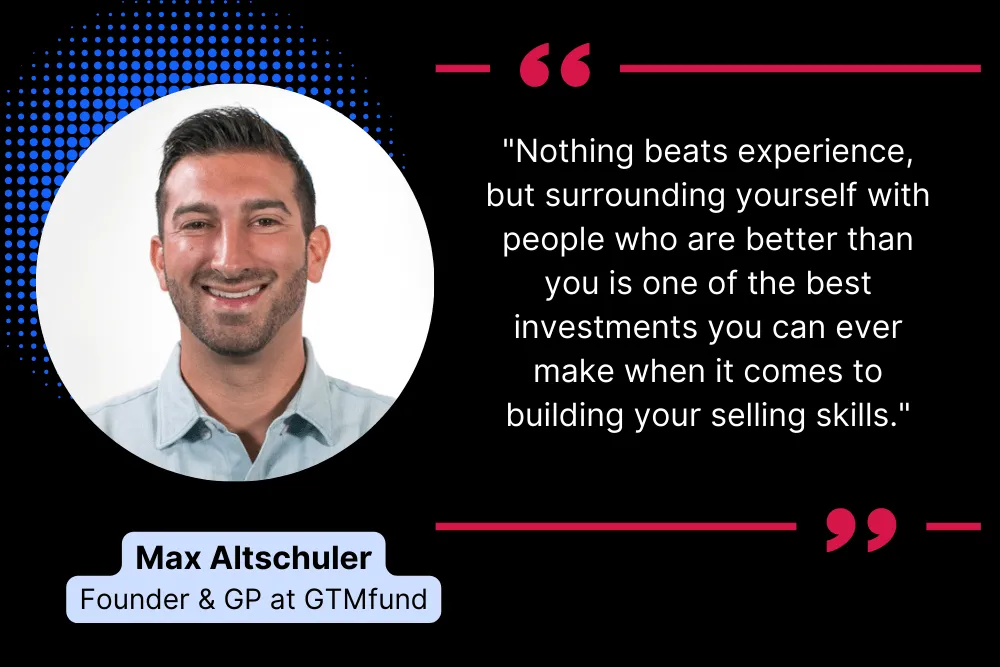 |
Entrepreneur, speaker, and bestselling author of the book Hacking Sales, Max Altschuler, has worked in and consulted with dozens of high-performing sales organizations over the years.
“Nothing beats experience, but surrounding yourself with people who are better than you is one of the best investments you can ever make when it comes to building your selling skills,” Altschuler says.
This should come as no surprise. One of the most consistently shared pieces of business advice I’ve gotten from world-renowned entrepreneurs like Tim Ferriss, Richard Branson, and Arianna Huffington always tends to come back to surrounding yourself with people you can learn from—people who will push you to become better at your craft.
The mentorship factor is equally as important for a career in sales. Altschuler adds, “if you’re in sales, go track down the smartest person you can find in the area you want to build your expertise in—and disregard how much more money you can make elsewhere. In the long run, you’ll make a lot more money, learn a lot more, and be more fulfilled by going out and working for the smartest person you can find.”
21. Build Rapport With Junior Staff
— James Wilkinson, CEO of Balance One Supplements
 |
Having trouble reaching decision-makers? Here’s a sales tip from one entrepreneur that you may be overlooking in your outreach strategy:
“Build connections and rapport with the junior staff of the corporate leads that you’re targeting,” says James. “Many of them are likely to be future decision-makers, and maintaining a good relationship with them can create a steady flow of business opportunities in the future.
“Moreover, junior staff may have better access to current decision-makers. By building trust and good relationships with them, you’re likely to get referrals to these senior decision-makers, improving your chances of landing a sale. Non-managerial staff can also provide valuable insights into company culture, products, and needs, helping you tailor your sales approach to better fit the company's needs.”
22. Learn From Those Who’ve Gone Before You
— Dorie Clark, Marketing Consultant, Bestselling Author, Speaker
Dorie Clark, the bestselling author, speaker, and sought-after marketing consultant to companies like Google, Microsoft, and The World Bank, has learned a lot about what it takes to close high-value contracts with enterprise organizations.
Here’s her best piece of sales advice:
“When it comes to building my selling skills, I’d actually make a book recommendation. A book that’s been really helpful to me is called Million Dollar Consulting by Alan Weiss. He did a great job in terms of how to structure proposals, how to have good conversations with buyers, and he has a great deal of expertise to share.”
For Clark, whose goal was to build her own million-dollar consulting business when she first got started, the lessons and advice she picked up from this book were directly applicable to accelerating her career. Start with our picks for the best sales books of all time and find the experts you can learn the most from.
23. Be Customer Centric
— Max Benz, CEO of BankingGeek
 |
“The best advice that I ever received and has influenced my career in sales is to always be customer-centric. One of the most important aspects of sales is building relationships and understanding the customer’s needs. When you focus on the customer and their needs instead of just trying to make a sale, you will be better positioned to provide them with the best solution for their particular situation. This has helped me create more successful sales outcomes, build trust with clients, and develop meaningful relationships with customers.”
24. Listen to Your Sales Call Recordings
— Neil Patel, Co-Founder at Crazy Egg, Kissmetrics, Quicksprout
 |
Whether you’re selling your own product or managing a team of reps, this piece of sales advice from Neil Patel, three-time SaaS co-founder of Quicksprout, Kissmetrics and Crazy Egg, is applicable to anyone who wants to improve their selling abilities.
“The best thing I’ve ever done when it comes to building my selling skills [and that of my team] is listening to recorded calls. Listen to your sales calls and do roleplay. More importantly, don’t do this just once a week or once a month—we do this literally every single day with every salesperson on our team. That’s the reason our team closes so well,” Patel shares.
“It’s bullshit to say here’s a script, or you’re already good to go based on past performance, because you’re always going to get edge cases in sales. You have to not only listen to your recorded calls, but have [your reps] admit where they screwed up, get them to understand why, roleplay to help them get better, and then listen to future calls to see if they’ve fixed it. It takes time to break bad habits, so repetition is key.”
25. Be Empathetic and Listen to Your Prospect’s Pain Points
— Ben Sardella, SaaS Sales Leader and Investor
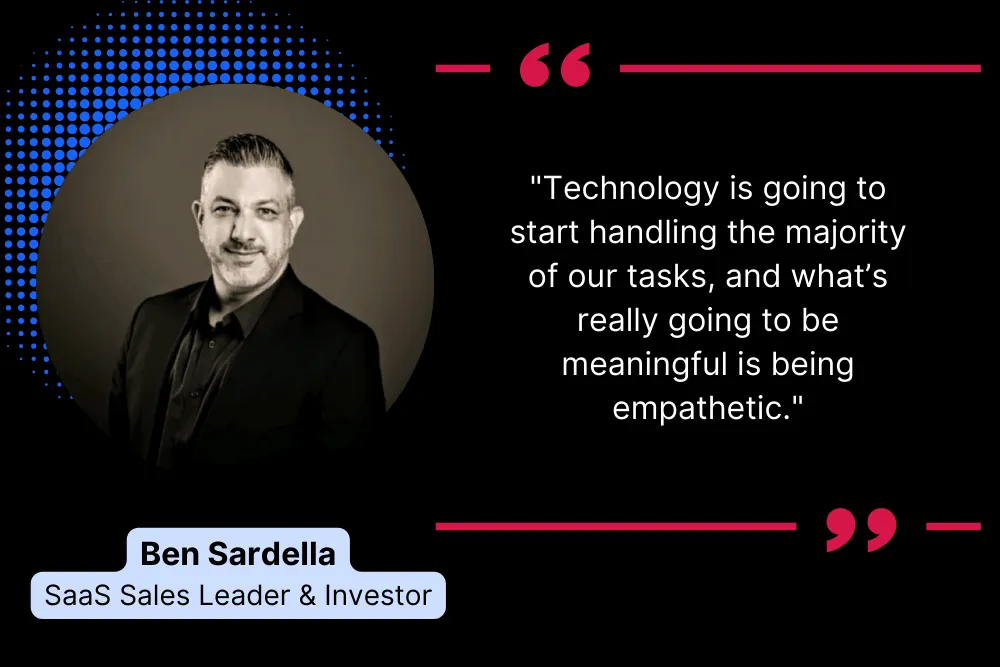 |
Ranked as one of the world’s most influential sales professionals, Ben Sardella started out as the first sales rep at NetSuite back in the day, and has co-founded companies like Datanyze and OutboundWorks.
As a constant advocate of testing, experimenting, and iterating with new sales tools that hit the market, when Sardella’s asked to share his best sales advice, he cuts straight to the core of why people buy.
“I love new tools, because they’re exciting. But as we get into the future of sales, we need to take a huge step back and focus on the skills that are not technology-related at all,” Sardella explains.
“The technology is going to start handling the majority of our tasks, and what’s really going to be meaningful is being empathetic. How able and willing are you to actually listen to your prospect’s pain points? How responsive are you going to be? What are you going to say and commit to? What research will you do to truly understand their business so you can get personalized when you engage your prospects?”
26. Develop an Ownership Mentality
— Krysten Conner, Enterprise AE at UserGems
 |
"For me, the advice best sales advice I ever received was, You are the CEO of your territory. Always act with an 'Ownership Mentality'. And the phrase 'that's not my job' should not be in your vocabulary."
27. Listen to Understand, Not to Respond
— Nicky Dutta, CEO of Lorel Diamonds
 |
“One of the most common sales stereotypes out there is that we're the "win the deal at all costs" type of person that we tend to miss being empathetic because we're only thinking about the next thing to say,” explains Nicky.
“Listening to understand breaks this stereotype every customer has. Successful sales happen because a salesperson understood what the customer needs.When you listen, you get to tap into the emotions of the customer, which is always a factor that affects their decision to make a purchase. In addition to this, you also get to become more genuine and sincere; you get to be yourself as you open the relationship between you and the potential customer.
“Heeding this advice has helped me understand my customers well. I own a custom jewelry company, so I focused on listening to what my clients need. Most of the time, customers have emotional attachments to the jewelry they're requesting. Listening helped me understand these emotions, which led me to deliver the best result possible. Not only did it make a huge difference to the numbers I have, but it also helped with my brand's reputation.
“Remember this: if you're asking questions for a few minutes, you're "stupid" for a few minutes. But if you are not listening and asking questions, you stay stupid for the rest of your life, or at least your whole sales career.”
28. Focus on Needs, Not Features
—Dan Gower, Owner at Buddy Gardner Advertising
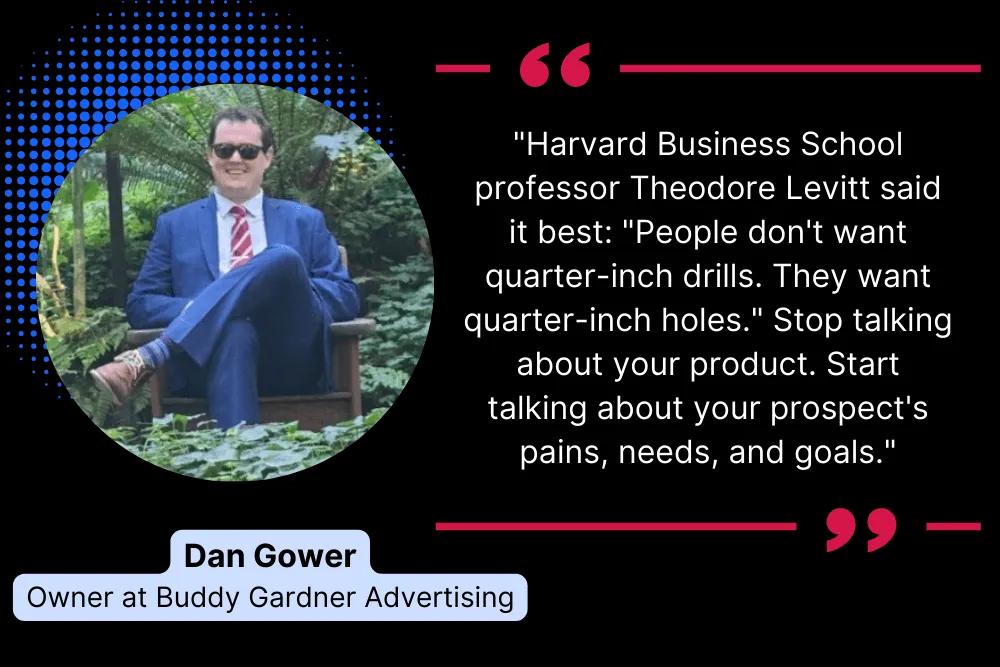 |
After a sales career writing over 950 sales cadences and working with all types of sales teams, here is the best piece of sales advice that Dan has to offer:
“My #1 piece of advice is to focus on the prospect's needs instead of the features of your product. Harvard Business School professor Theodore Levitt said it best: "People don't want quarter-inch drills. They want quarter-inch holes."
“Stop talking about your product. Start talking about your prospect's pains, needs, and goals.”
29. Commit to Your Greater Vision
— Chase Jarvis, Founder of CreativeLive, Award-Winning Photographer
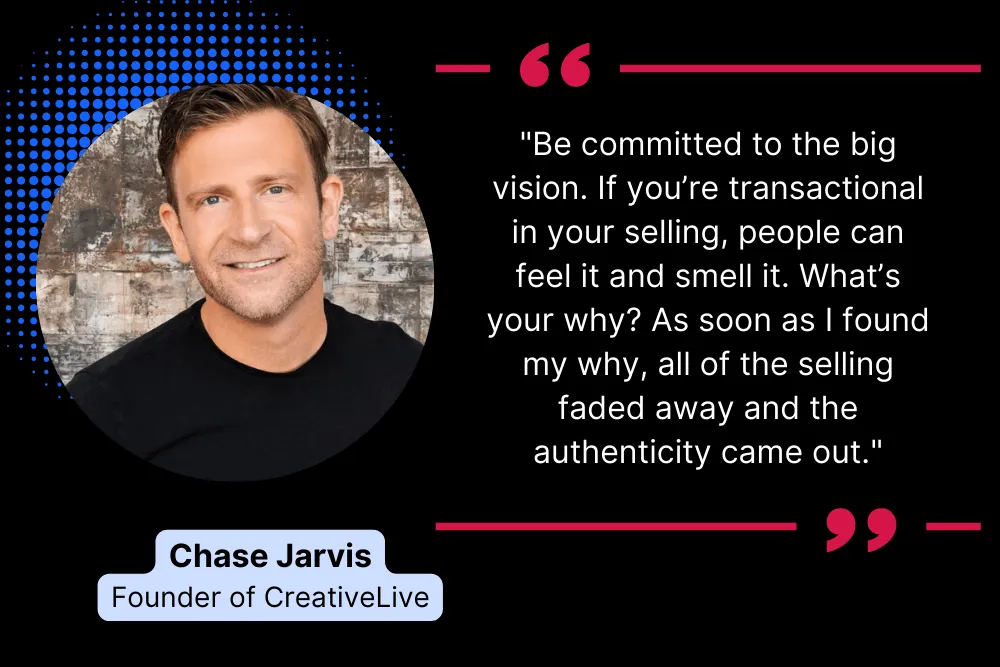 |
We’ve all been the recipient of a transactional sale at some point. When you can feel that you’re being sold not because the product or service will have a clear, meaningful impact on your life, but purely for the sake of lining the pockets of the person doing the selling.
Entrepreneur, photographer, and director Chase Jarvis can sniff out the transactional salesperson from a mile away. When asked to share his best sales advice, here’s what Jarvis has to say.
“Be committed to the big vision. If you’re transactional in your selling, people can feel it and smell it. What’s your why? As soon as I found my why, all of the selling faded away and the authenticity came out. If you’re committed to something for the next two weeks, the next paycheck, be careful because that narrative is a trap—pretty soon, that eroding mentality of constantly chasing the next thing will hurt you,” Jarvis explains.
“Alignment and playing a game that I actually care about has made all the difference in the world. It also provides a level of hunger that can’t be achieved when you’re just working towards a check.”
30. Understand the Customer’s Perspective
— Lisa Dietrich, Partner at Girokonto.io
“One piece of advice that has been integral to my success as a sales manager is understanding the customer’s perspective,” says Lisa.
“When I first started out, I had a hard time understanding why a customer wouldn’t buy something even though I felt it was the best product or service for them. I realized that while it may have made sense to me, the customer needed to feel like they were making the choice that would be best for them. By taking their wants and needs into consideration before making a sale, I saw my success rate increase significantly.
“Be proactive, rather than reactive. It’s important to anticipate how customers will react when presented with an opportunity or solution and prepare accordingly. Being able to understand what each customer needs and how it will benefit them is also essential for successful selling.”
Want More Sales Advice?
We've created a collection of templates, scripts, checklists, and books to help you level up your sales skills. Get your free copy today!










